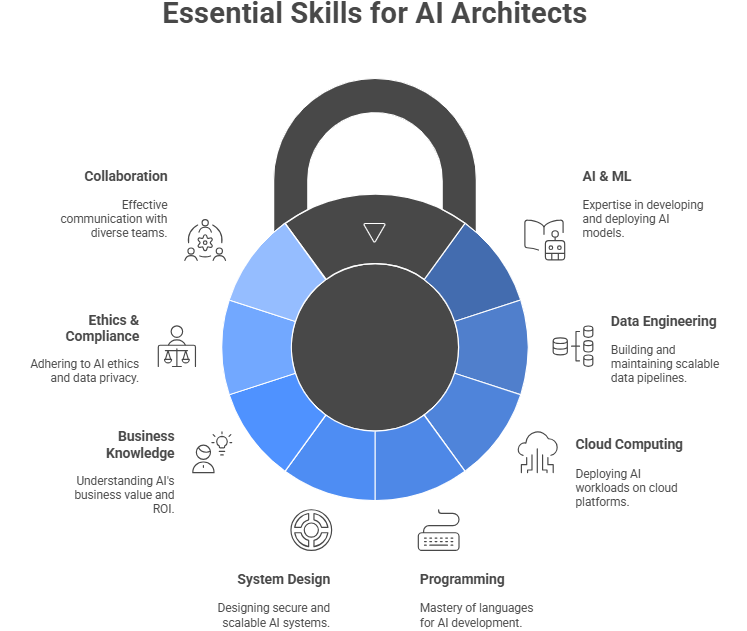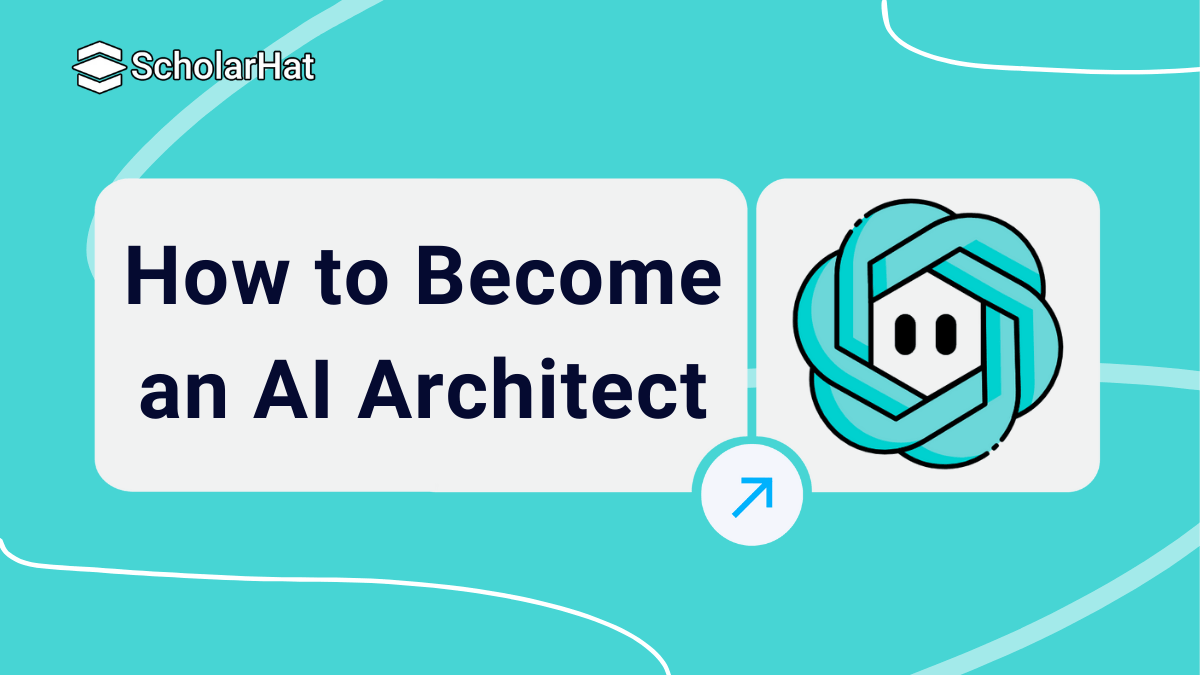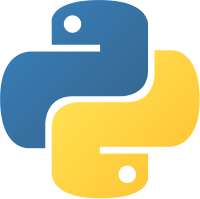27
FebHow to Become an AI Architect in 2025?
To become an AI architect in 2025, you need a mix of technical skills, strategic thinking, and hands-on experience with AI systems design. This role is crucial in shaping the future of technology. AI architects create and manage complex AI systems that drive innovations in fields like tech, healthcare, and finance. The demand for AI architects is expected to rise by 25% by 2025, offering great opportunities.
In this Artificial Intelligence tutorial, you will able to know important skills, education, certifications, and steps to help you succeed as an AI architect.
Who are Artificial Intelligent Architect?
An AI architect is a professional who designs and manages the implementation of Artificial intelligent systems. They integrate machine learning models, data pipelines, and cloud infrastructure to tackle complex business problems. Unlike data scientists, who focus on developing models, or machine learning engineers, who fine-tune algorithms, AI architects connect technical and strategic roles. They ensure scalability and efficiency in projects.
Key Responsibilities of an AI Architect

- Designing AI System Architectures: To Create end-to-end AI architectures that are scalable, high-performing, and tailored to business needs and to make sure they can handle large datasets and complex workloads.
- Integrating Machine Learning Models: Transition ML models from experimentation to production. Ensure smooth deployment, monitoring, and ongoing optimization for real-world performance.
- Collaborating with Teams: Work closely with data scientists, software engineers, product managers, and stakeholders. Align AI solutions with strategic business goals.
- Optimizing Data Pipelines and Cloud Infrastructure: Streamline data ingestion, processing, and storage. Use cloud platforms like AWS, Azure, and GCP to maximize efficiency and lower costs.
- Ensuring Ethical and Responsible AI: Implement frameworks and policies to promote fairness, transparency, privacy, and security. Maintain system reliability and comply with regulations.
Key Skills Required to Become an AI Architect

1. Artificial Intelligence & Machine Learning
- Ability to develop, train, and fine-tune ML/DL models using frameworks like TensorFlow and PyTorch.
- Experience in deploying AI models into production with monitoring and optimization strategies.
2. Data Engineering & Big Data
- Expertise in building and maintaining scalable data pipelines and ETL workflows.
- Hands-on experience with big data tools like Apache Spark, Hadoop, and Kafka for processing large datasets.
3. Cloud Computing
- Skilled in deploying AI workloads on AWS, Azure, or Google Cloud for high availability and scalability.
- Knowledge of cloud-native services like AI APIs, managed ML platforms, and serverless computing.
4. Programming Skills
- Mastery of Python, R, and SQL for AI development, data manipulation, and analysis.
- Understanding of APIs, RESTful services, and microservices architecture for integration.
5. System Design & Architecture
- Ability to design secure, scalable AI systems with high availability and fault tolerance.
- Proficiency in using tools like Kubernetes and MLOps frameworks for production-level deployments.
6. Business Knowledge
- Understanding how AI solutions can drive business value and ROI.
- Ability to translate technical capabilities into strategic advantages for organizations.
7. Ethics & Compliance
- Knowledge of AI ethics principles such as fairness, transparency, and accountability.
- Awareness of global data privacy regulations like GDPR and India’s DPDP Act.
8. Collaboration & Communication
- Strong interpersonal skills to work effectively with engineers, data scientists, and business leaders.
- Ability to present complex AI concepts in simple, clear language for decision-makers.
Educational Requirements for becoming AI Architect
A strong educational foundation is key to becoming an AI architect. A bachelor’s degree in Computer Science, Data Science, or a related field is typically required, with many employers preferring a master’s degree for advanced roles.
Bachelor’s Degree
- Minimum qualification in Computer Science, Data Science, Artificial Intelligence, Software Engineering, or related fields.
- Provides foundational knowledge in algorithms, programming, and database management.
- Prepares candidates for entry-level roles and hands-on AI/ML projects.
Master’s Degree (Optional but Preferred)
- Specialization in AI, Machine Learning, Data Analytics, or Cloud Computing for advanced expertise.
- Offers deeper research opportunities and exposure to complex AI architectures.
- Enhances career prospects for leadership and architect-level roles.
Mathematics & Statistics Knowledge
- Strong grasp of linear algebra, probability, and statistical modeling for algorithm development.
- Essential for understanding AI model behavior, optimization, and accuracy.
- Supports problem-solving in real-world AI system design.
Recommended Certifications:
- AWS Certified Machine Learning: Specialty: Focuses on cloud-based AI solutions.
- Google Professional Machine Learning Engineer: Covers model deployment and MLOps.
- Microsoft Azure AI Engineer Associate: Emphasizes Azure AI tools.
- Udacity AI Architect Nanodegree: Practical, project-based learning.
Step-by-Step Guide to Becoming an AI Architect in 2025
Follow these actionable steps to build a successful career as an AI Architect:
1. Build a Strong Foundation
- Learn programming languages : Master Python (AI/ML libraries like TensorFlow, PyTorch, scikit-learn) and R for statistical modeling.
- Mathematics for AI: Strengthen skills in linear algebra, statistics, probability, and calculus — essential for understanding ML algorithms.
- Data Handling Skills: Learn SQL and NoSQL databases for data management and preprocessing.
2. Gain AI/ML Knowledge
- Master Core Concepts: Master machine learning, deep learning, and natural language processing (NLP).
- Take Structured Courses: Platforms like Coursera, edX, ScholarHat, and Udemy offer guided AI Architect learning paths.
- Understand System Design: Learn to design AI pipelines, model deployment strategies, and integration into enterprise applications.
- Study cloud computing platforms such as AWS, Azure, and Google Cloud.
- Learn DevOps and MLOps : Understand CI/CD for AI, containerization (Docker, Kubernetes), and model lifecycle management
3.Gain Practical Experience
- Participate in Competitions: Join Kaggle challenges to solve real-world AI problems.
- Industry Internships: Apply for internships in AI-focused companies to understand practical implementation.
- Open-Source Contributions: Collaborate on GitHub projects to showcase your skills to potential employers.
4. Earn Certifications
- Certifications validate your technical skills, specialization areas, and industry readiness as an AI Architect. They also help you stand out in competitive job markets.
- Obtain credentials like AWS Certified Machine Learning Specialty or Google Professional Machine Learning Engineer.
- Consider pursuing advanced certifications in cloud architecture and AI ethics.
5. Build a Portfolio
- Highlight Diverse AI Projects: Include chatbots, recommendation engines, fraud detection models, and predictive analytics tools.
- Show Business Impact: Document how your AI solutions improved efficiency, reduced costs, or generated insights.
- Publicly Showcase Work: Use GitHub, LinkedIn, or a personal portfolio site to display projects.
6. Network and Apply
- Networking Events: Attend seminars, meetings, and industry conferences to network with other industry experts. These gatherings provide networking opportunities and insightful analyses of current trends.
- Attend AI Events: Join conferences like NeurIPS, AI Summit, and Open Data Science Conference (ODSC).
- Join AI communities, engage in discussions, and apply for AI Architect positions.
Tools and Technologies to Master in 2025
AI architects must stay ahead of technological trends. Here are key tools and platforms to master in 2025:
- Machine Learning Frameworks: TensorFlow, PyTorch, Scikit-learn for model development.
- Cloud Platforms: AWS, Azure, Google Cloud for scalable deployments.
- Containerization: Docker and Kubernetes for managing AI workloads.
- Data Engineering Tools: Snowflake, Databricks for data pipelines.
- MLOps Tools: Kubeflow, MLflow for model lifecycle management.
- Emerging Technologies: Edge AI, AutoML, and generative AI frameworks (e.g., Hugging Face).
Career Opportunities for AI Architects in 2025
1.AI Architect:
- What They Do: Designs end-to-end AI solutions — from data ingestion to model deployment — and ensures these solutions align with business objectives.
- Key Skills: AI system design, cloud platforms (AWS, Azure, GCP), data pipelines, API integration, AI governance.
- Career Scope: Often works at the intersection of business strategy and technical execution, making them valuable in industries like finance, healthcare, retail, and manufacturing.
2. Machine Learning Architect
- What They Do: Specializes in building, training, and optimizing ML models for real-world production environments.
- Key Skills: Python, TensorFlow/PyTorch, feature engineering, distributed training, model optimization.
- Career Scope: In high demand in autonomous systems, fraud detection, predictive analytics, and personalized recommendation systems.
3. Data Science Lead
- What They Do: Oversees data science teams, manages analytics strategies, and ensures insights are actionable for business decision-making.
- Key Skills: Statistical modeling, data visualization (Tableau, Power BI), big data tools (Hadoop, Spark), leadership skills.
- Career Scope: Plays a crucial role in transforming raw data into competitive advantage across sectors like e-commerce, telecom, and banking.
4. Cloud AI Solutions Architect
- What They Do: Focuses on deploying AI models on cloud platforms (AWS SageMaker, Azure AI, GCP Vertex AI) to ensure scalability, reliability, and cost-efficiency.
- Key Skills: Cloud architecture, containerization (Docker, Kubernetes), APIs, security, and DevOps integration.
- Career Scope: High relevance in enterprises moving to cloud-first AI infrastructure, especially SaaS companies and startups.
5. MLOps Engineer
- What They Do: Manages the full lifecycle of AI models — from development and testing to deployment, monitoring, and retraining.
- Key Skills: CI/CD pipelines, Kubernetes, MLflow, model versioning, monitoring tools (Prometheus, Grafana).
- Career Scope: Essential in any AI-driven organization that continuously updates models for accuracy and performance.
6. AI Strategy Consultant
- What They Do: Advises businesses on AI adoption, feasibility, and roadmap planning while ensuring ROI.
- Key Skills: AI business strategy, market analysis, stakeholder communication, ethical AI practices.
- Career Scope: Works with C-level executives to integrate AI into core business operations, making them highly valued in consulting firms and enterprise leadership roles.
AI Architect job role, salary range, and experience level for 2025:
| Job Title | Role Description | Average Salary (INR) | Experience Level |
| AI Solutions Architect | Designs AI solution architecture, selects tools/frameworks, manages data pipelines, ensures AI governance & compliance, collaborates with tech/business teams. | ₹8 – ₹15 LPA | Entry-Level (0–2 years) |
| Machine Learning Architect | Leads AI/ML project design & deployment, optimizes performance, manages AI infrastructure, integrates with enterprise systems. | ₹16 – ₹30 LPA | Mid-Level (3–6 years) |
| Data Science Lead | Oversees data-driven projects, analytics strategies, and team leadership. | ₹15 – ₹28 LPA | Mid-Level (3–6 years) |
| Cloud AI Solutions Architect | Deploys AI models on cloud platforms ensuring scalability, cost-efficiency & security. | ₹18 – ₹33 LPA | Senior Level (6+ years) |
| MLOps Engineer | Manages AI model lifecycle from development to deployment & monitoring. | ₹14 – ₹28 LPA | Mid Level |
| Chief AI Strategy Consultant | Develops enterprise AI strategy, oversees multiple AI projects, ensures scalability & ethical AI practices, drives innovation. | ₹35 – ₹60+ LPA | Senior-Level (7+ years) |
Industries Hiring AI Architects:
- Information Technology & Software: AI-driven application development and automation.
- Healthcare & Life Sciences: AI for diagnostics, drug discovery, and patient care optimization.
- Finance & Banking: Fraud detection, risk modeling, and personalized financial services.
- Retail & E-commerce: AI-powered recommendation engines and demand forecasting.
Future Trends for AI Architects in 2025 and Beyond
1. Generative AI Integration
- Adoption of tools like ChatGPT, DALL·E, and Midjourney for content creation, design, and automation.
- Use in building intelligent assistants, enhancing creativity, and speeding up product development.
2. Edge AI Deployment
- Running AI models on IoT and edge devices for real-time data processing.
- Reducing latency and improving decision-making in industries like manufacturing, healthcare, and transportation.
3. Explainable AI (XAI)
- Emphasis on transparency to help stakeholders understand AI decision-making.
- Compliance with regulations that demand model interpretability and accountability.
4. MLOps Maturity
- Streamlining AI model lifecycle from development to deployment.
- Using tools like MLflow and Kubeflow for automated pipelines, monitoring, and version control.
5. AI Ethics & Governance
- Implementation of ethical guidelines to avoid bias and ensure fairness.
- Strengthening privacy, security, and compliance with laws like GDPR and DPDP Act.
Conclusion
Becoming an AI architect in 2025 needs a smart mix of education, technical skills, and practical experience. By mastering programming, machine learning, and system design, earning certifications, and creating a solid portfolio, you can prepare yourself for success in this in-demand field. Industries such as tech, healthcare, and finance are increasingly depending on AI, which means the opportunities are large.
Stay ahead by embracing new trends like ethical AI and edge computing. Also, take steps to network and display your expertise. Begin your journey today with the Azure AI Engineer Training and gain practical, industry-relevant skills
FAQs
Take our Artificialintelligence skill challenge to evaluate yourself!

In less than 5 minutes, with our skill challenge, you can identify your knowledge gaps and strengths in a given skill.






